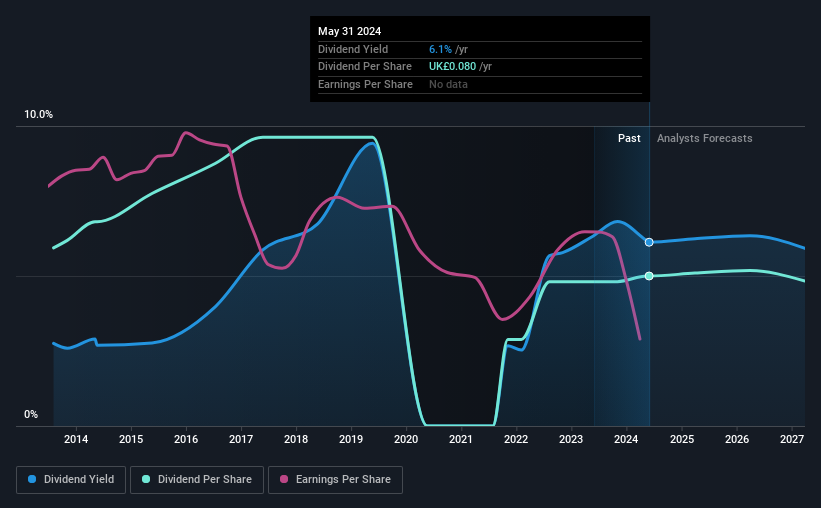BT Group (LON:BT.A) Is Increasing Its Dividend To £0.0569
The board of BT Group plc (LON:BT.A) has announced that the dividend on 11th of September will be increased to £0.0569, which will be 5.6% higher than last year's payment of £0.0539 which covered the same period. This will take the annual payment to 6.1% of the stock price, which is above what most companies in the industry pay.
See our latest analysis for BT Group
BT Group's Payment Has Solid Earnings Coverage
Impressive dividend yields are good, but this doesn't matter much if the payments can't be sustained. Before making this announcement, BT Group's was paying out quite a large proportion of earnings and 79% of free cash flows. This indicates that the company is more focused on returning cash to shareholders than growing the business, but it is still in a reasonable range to continue with.
Over the next year, EPS is forecast to expand by 56.9%. Assuming the dividend continues along the course it has been charting recently, our estimates show the payout ratio being 55% which brings it into quite a comfortable range.
Dividend Volatility
The company has a long dividend track record, but it doesn't look great with cuts in the past. The annual payment during the last 10 years was £0.095 in 2014, and the most recent fiscal year payment was £0.08. Doing the maths, this is a decline of about 1.7% per year. Declining dividends isn't generally what we look for as they can indicate that the company is running into some challenges.
The Dividend Has Limited Growth Potential
Given that the dividend has been cut in the past, we need to check if earnings are growing and if that might lead to stronger dividends in the future. BT Group's EPS has fallen by approximately 17% per year during the past five years. Such rapid declines definitely have the potential to constrain dividend payments if the trend continues into the future. Over the next year, however, earnings are actually predicted to rise, but we would still be cautious until a track record of earnings growth can be built.
The Dividend Could Prove To Be Unreliable
Overall, this is probably not a great income stock, even though the dividend is being raised at the moment. The track record isn't great, and the payments are a bit high to be considered sustainable. We don't think BT Group is a great stock to add to your portfolio if income is your focus.
It's important to note that companies having a consistent dividend policy will generate greater investor confidence than those having an erratic one. Meanwhile, despite the importance of dividend payments, they are not the only factors our readers should know when assessing a company. For example, we've picked out 4 warning signs for BT Group that investors should know about before committing capital to this stock. If you are a dividend investor, you might also want to look at our curated list of high yield dividend stocks.
Have feedback on this article? Concerned about the content? Get in touch with us directly. Alternatively, email editorial-team (at) simplywallst.com.
This article by Simply Wall St is general in nature. We provide commentary based on historical data and analyst forecasts only using an unbiased methodology and our articles are not intended to be financial advice. It does not constitute a recommendation to buy or sell any stock, and does not take account of your objectives, or your financial situation. We aim to bring you long-term focused analysis driven by fundamental data. Note that our analysis may not factor in the latest price-sensitive company announcements or qualitative material. Simply Wall St has no position in any stocks mentioned.

 Yahoo Finance
Yahoo Finance 
